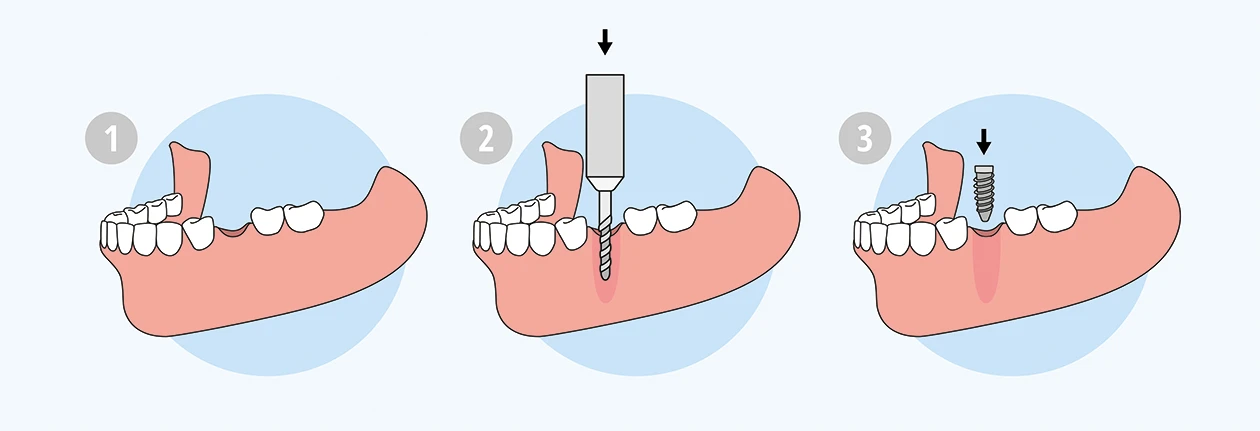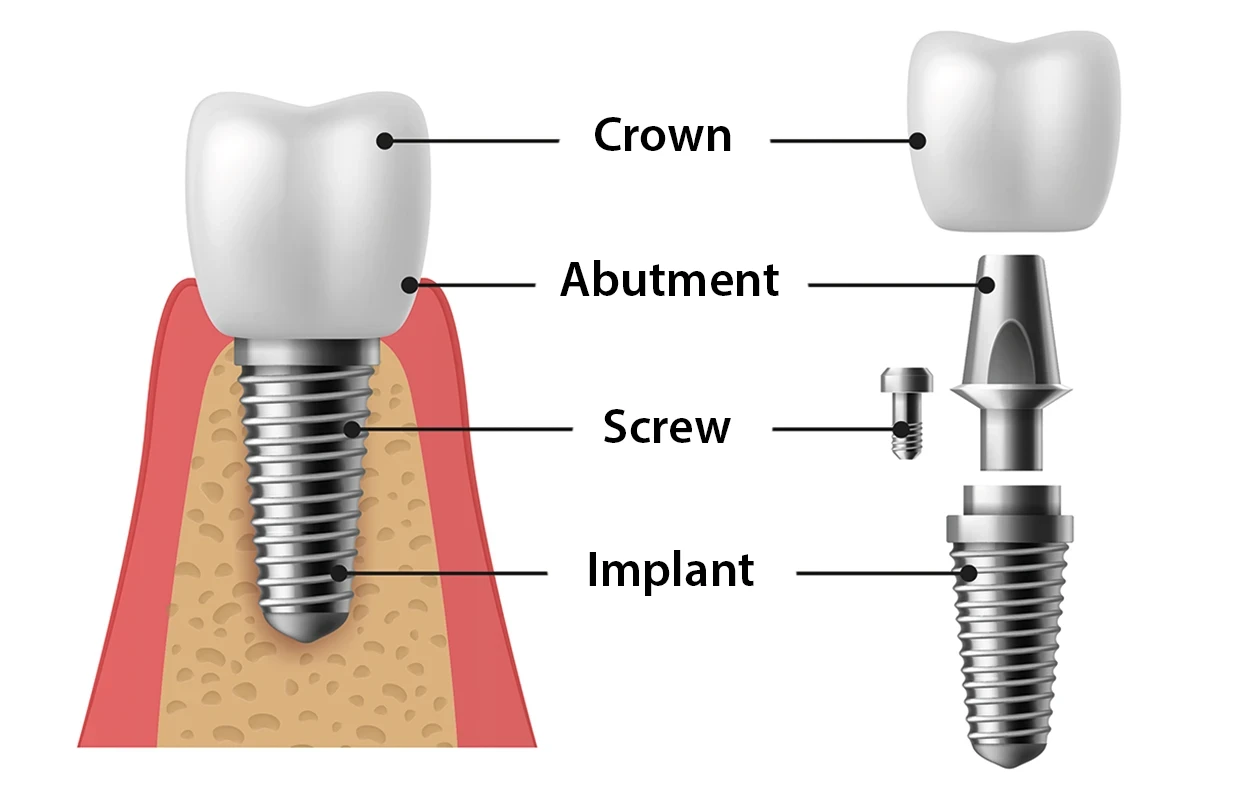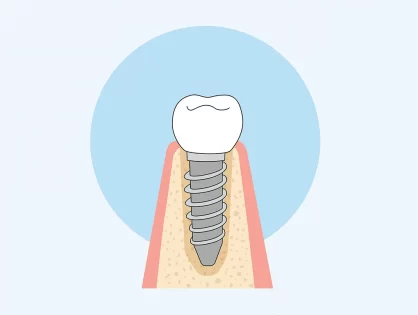Dental implant surgery is one of the most common methods of restoring the function of teeth. The method allows to restore esthetics and function of teeth row at the single or multiple teeth loss. Moreover, dental implants are successfully applied at full mouth restoration when all teeth are missing.
However, there are too many myths as to this procedure despite of successful experience of implant surgeries since 1965, and for this time, millions of dental implants have already been installed around the world for patients of different ages. Today, our dental surgeon will tell you about the important details of the procedure.
Types of implants
Dental implant surgery is a procedure that replaces tooth roots with metal titanium screw construction and replaces missing tooth or teeth with artificial teeth. It becomes the base support for a future tooth crown or fixed implant.
In addition to the most common dental or endosteal (in the bone) implants used today, the following dental implants are known in dentistry:
- Basal implantation — the construction is integrated into the basal layer of a jaw. The procedure is traumatic and is used in exceptional cases.
- Endodontic endosseous implantation — the implant is inserted into the root of the tooth, having removed the nerves from it. However, later due to the destroyed root the inflammatory process can develop, and the root can be damaged. The procedure is outdated and is almost not used now.
- Subperiosteal (on or above the jawbone) implantation — quite traumatic procedure, which is used when other methods are impossible.
In 90% of cases, dental surgeons recommend exactly dental implants.
Pros of dental implantation
- High percentage of construction rooting. Integration of the titanium rod into the bone occurs and over time the pin literally grows into the bone. In 97% of cases, the procedure is completed by successful integration of the construction.
- High aesthetics. It is extremely difficult to distinguish between teeth when prosthetic teeth, due to modern composite materials.
- Neighboring healthy teeth remain intact. You do not need to depulpation the adjacent teeth to set the implant.
- Versatility. Dental implants allow compensating both the absence of one tooth and several teeth.
- Hypoallergenic. The prosthesis is performed with the use of titanium construction. It is a hypoallergenic, inert metal, which is actively used in medicine. That is why dental implants are recommended for those who have allergy to latex removable constructions.
Cons of dental implantation
Dentists highlight that tooth implantation is a serious dental surgery, that is performed strictly by a dental surgeon in the clinic. Intervention in the jaw bone and the recovery process may be accompanied by such negative but short-term effects as:
- Pain and fever, feeling of “pressure” in the bone, where the titanium construction was integrated. If you follow all the recommendations of the doctor, discomfort will disappear within 3–5 days.
- Implant rejection. The phenomenon is rare, which occurs only in 2-3% of patients. Often this is facilitated by the patient’s failure to comply with the recommendations of the surgeon.
- Long healing process. The structure becomes stable after 4–6 months when it is integrated with the jawbone. Until this point, it is undesirable to significantly load the site with an implant, to bite hard food on this side.
All these minuses are overridden by the advantages of the procedure. The success of tooth transplantation also depends on the patient’s clinical case, the presence of additional diseases, the accuracy of follow-up recommendations, the physician’s qualification and the quality of materials used.
What are the steps of dental implant placement?
The procedure starts with a dental examination and jawbone CT scan. Dentist evaluates the following:
- jaw bone height
- jaw arch width
- the state of the roots of the neighboring teeth, where the implants procedure will take place
- condition of bones and absence of inflammatory processes on the jaw
- depth and size of the maxillary sinuses.
After assessing all these anatomical parameters and collecting the anamnesis, the doctor plans the operation and selects the type of the implant – short (up to 10 mm) or classic (from 10 mm), the manufacturer and the method of the implant (classic, “all-on-4” or “all-on-6”).
The most popular implant brands are: Straumann, Nobel, Bicon, and Astra Tech. Producers of these implants offer a wide range of solutions for many clinical cases (implants of different designs, shapes and lengths, abutments with different angle of inclination). It is worth remembering that the use of high-quality implants allows to achieve the best result of treatment.
On the day of manipulation, tissue is cut to the patient under anesthesia, penetrating to the jaw bone. Using dental instruments, a hole is made in the bone, where a titanium screw-like implant is screwed. After the procedure, the hole is sewn up, and the patient is sent home.

What should you do immediately after the implantation?
Immediately after the procedure for 48 hours, the pain is quite natural. To minimize the discomfort, painkillers can be used. But it is forbidden to take aspirin. This drug has the properties of an anticoagulant, can provoke bleeding in injured gums. In any case, it should be strictly observed the recommendations of the doctor.
Also prohibited:
- To drink through a straw. It can form a vacuum environment in the mouth cavity, which can provoke bleeding.
To eat hot or cold drinks, spicy dishes. - To drink energetics and coffee. Products with high caffeine content increase pressure, provoking bleeding.
The first two weeks, sports, saunas, and baths are strictly prohibited.
How to properly care for the oral cavity before and after the procedure?
Before implantation, doctors advise eating. Thoroughly clean the teeth, gums, and tongue with toothpaste and brush, tooth string, rinse the mouth cavity with rinse liquid. If the patient accepts anticoagulants, the doctor must be warned before the procedure.
After dental implantation procedure, the patient’s main goal is to follow the doctor’s recommendations. Therefore, it is categorically forbidden for the next 3 months to heavily load the jaw (eat harsh food, bite hard fruit, barbecue). Give preference to pureed food, steamed cutlets.
Especially, many questions arise regarding the hygiene of the oral cavity after manipulation. Instead of the classic toothbrush, try the special silk bristle surgical toothbrush. From the irrigators refuse at all. The flow of water under pressure can significantly affect the location of the transplantation and, later, stability of the construction.
A month after the procedure, the patient visits a doctor to monitor the rehabilitation process. If necessary, performs a CT scan to monitor the condition.
Summary
Don’t be afraid of dental implant surgery. This is a modern method, which for decades has been practiced all over the world for restoring beauty and health. This method allows you to obtain good and stable results of treatment if you follow the procedure.




